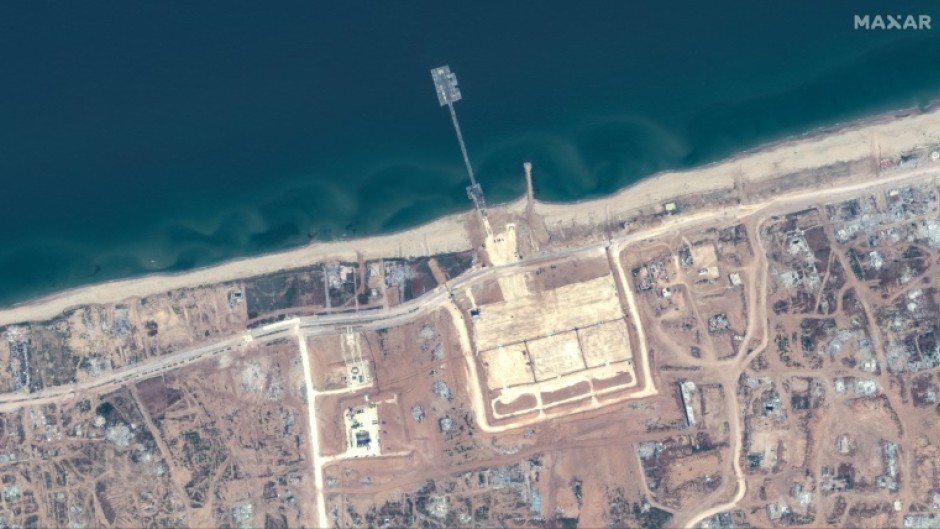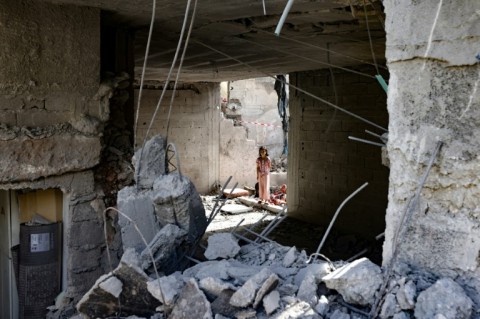
Heavy clashes and bombardment rocked Rafah on Saturday, as Israel pressed an assault against Hamas militants that has led hundreds of thousands of Palestinians to flee the southern Gaza city.
The Israeli military said its air forces hit more than 70 targets across the Gaza Strip while ground troops conducted "targeted raids" in eastern Rafah, killing 50 militants and locating dozens of tunnel shafts.
Hamas's armed wing, the Ezzedine Al-Qassam Brigades, said it fired a barrage of rockets towards the Israeli city of Ashkelon and targeted an Israeli command centre at the Jabalia refugee camp in the north of the Gaza Strip.
An AFP reporter said air strikes and artillery shells pounded eastern Rafah as warplanes criss-crossed over the city on Gaza's border with Egypt.
More than 10 days into what the army called a "limited" operation in Rafah that sparked an exodus of Palestinians, fighting between Israeli forces and Palestinian militants has also flared again in northern Gaza.
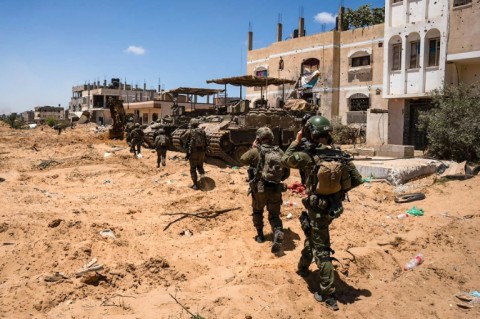
Israel said in early January it had dismantled Hamas's command structure in the north, but the army said Hamas -- whose October 7 attack sparked the war -- had been "in complete control here in Jabalia until we arrived a few days ago".
Hamas slammed what it called Israel's "intensified brutal raids" on Jabalia, saying they had killed dozens of civilians and wounded hundreds more while targeting schools and shelters.
"The escalating crimes of the occupation will not succeed in breaking the will of our brave resistance or in deterring our proud people from their decision to stand firm on their land," it said.
- First aid via pier -
The Israeli incursion into Rafah, launched despite overwhelming international opposition and as mediators were hoping for a breakthrough in stalled truce talks, has worsened an already dire humanitarian crisis, aid groups say.
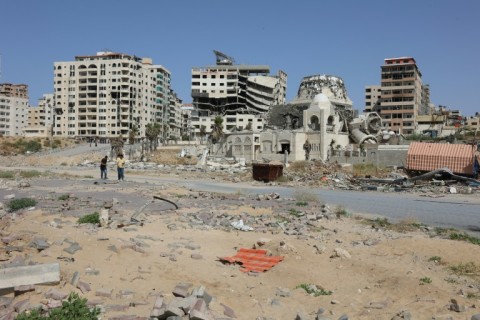
With key land crossings closed or operating at limited capacity due to the fighting, some relief supplies began flowing into Gaza via a temporary, floating pier constructed by the United States.
The Israeli army said 310 pallets began moving ashore in "the first entry of humanitarian aid through the floating pier".
Satellite pictures taken on Saturday showed more than a dozen trucks lining up on the approach road to the pier.
In the coming days, around 500 tonnes of aid are expected to be delivered to Gaza through the pier, according to US Central Command.
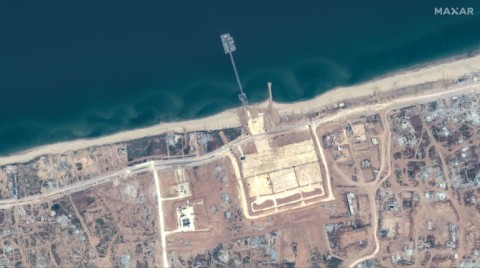
But UN agencies and humanitarian aid groups have warned sea or air deliveries cannot replace far more efficient truck convoys into Gaza, where the United Nations has repeatedly warned of looming famine.
The European Union welcomed the first shipment from Cyprus to the Gaza pier, but called on Israel to "expand deliveries by land and to immediately open additional crossings".
The Rafah crossing, a vital conduit for humanitarian assistance, has been closed since Israel launched its operation in the city last week.
The war began after Hamas's unprecedented October 7 attack on Israel, which resulted in the deaths of more than 1,170 people, mostly civilians, according to an AFP tally based on Israeli official figures.
Israel's retaliatory offensive against Hamas has killed at least 35,386 people in Gaza, mostly civilians, according to data provided by the Hamas-run territory's health ministry.
The toll includes at least 83 deaths over the past 24 hours, said a ministry statement on Saturday.
Out of 252 people taken hostage from Israel during the October 7 attack, 125 remain held in Gaza including 37 the army says are dead.
- 'Advancing and retreating' -
The army said troops in Gaza had recovered late Thursday the bodies of three hostages whom it said had been killed on October 7.
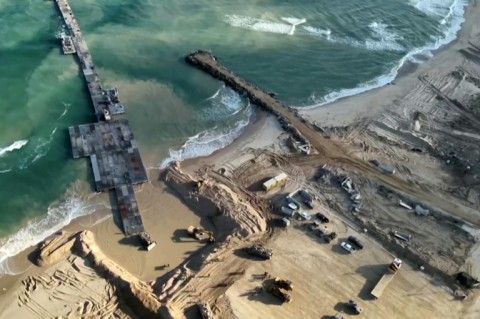
Israel has vowed to defeat remaining Hamas forces in Rafah, which it says is the last bastion of the Iran-backed group.
The looming Israeli assault has prompted nearly 640,000 of the 1.4 million people who had been sheltering in the southern city to flee to other areas, the UN has said.
Palestinian sources in Rafah said Israeli forces were operating in the city's Al-Salam and Jenina neighbourhoods as well as on the Philadelphi route along the Egyptian border.
"Troops are advancing and retreating around these areas," a security source said.
Cairo, which has been involved in mediation efforts during the war, says a potential Israeli takeover of Philadelphi could violate its landmark 1979 peace deal with Egypt.
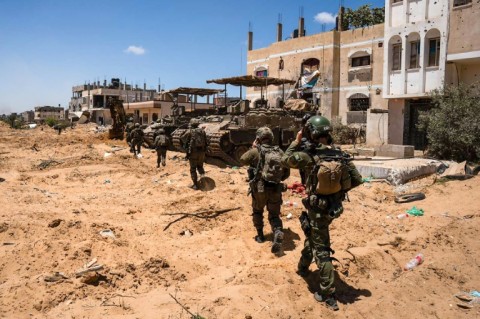
In northern Gaza's Beit Lahia, witnesses reported air strikes near Kamal Adwan hospital on Saturday.
The hospital's director Hussam Abu Safiya said Friday the facility had received "large numbers" of casualties from nearby Jabalia and was running low on supplies.
The fuel aid that had reached the hospital was "barely enough for a few days", Abu Safiya told AFP.
The World Health Organization has received no medical supplies in Gaza since the Rafah operation began on May 6, spokesman Tarik Jasarevic said Friday.
- Biden aide visits -
On the diplomatic front, US National Security Advisor Jake Sullivan was heading to the region for weekend talks.
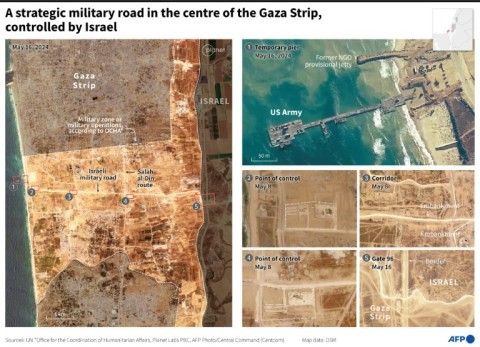
Sullivan will meet Saudi Crown Prince Mohammed bin Salman on Saturday and Israeli Prime Minister Benjamin Netanyahu on Sunday, National Security Council spokesman John Kirby said.
Meanwhile, Israel said it killed two senior Islamic Jihad militants in separate air strikes in the northern West Bank and in Rafah.
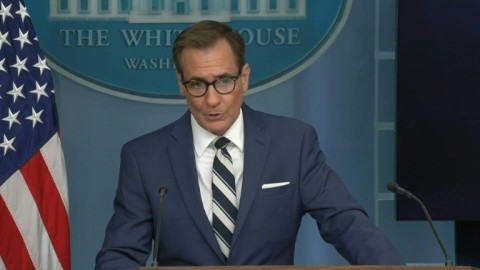
But there was no immediate comment from the group, which has fought alongside Hamas, on the army's announcement that a "significant" operative was killed in Rafah.
A military statement did not name the slain militant and said he had been involved in "preparing... for operations against IDF (army) ground troops in the area".
burs-lb/ami/dv

